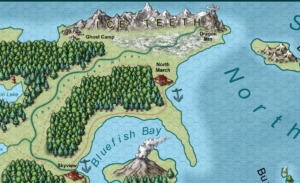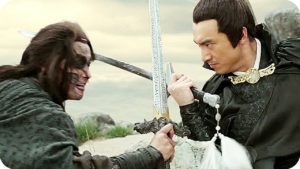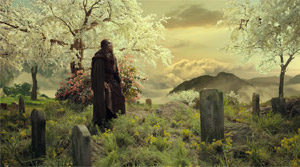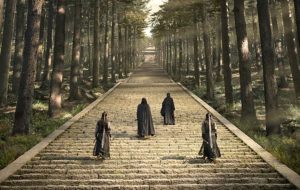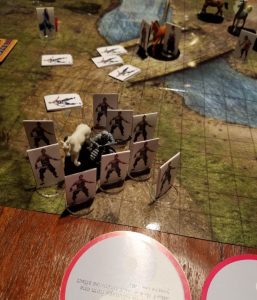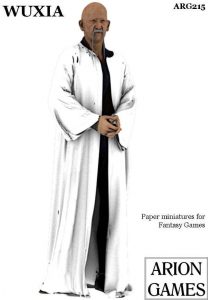There is an interesting thread on RPG.net: Power 19: 19 Questions to ask about your game II.
I’ve posted my answers there and am cross posting them here. I think these are a great exercise for any game development.
1.) What is your game about?
Art of Wuxia is an homage to ancient Chinese dramatic kung fu heroes and their stories and bringing that level of action and tropes to the game table.
2.) What do the characters do?
Characters go on adventures to fight evil doers with sword, fist and spells.
3.) What do the players (including the GM if there is one) do?
Players and GMs create exciting and dramatic action adventure stories in a mythical China that never was.
4.) How does your setting (or lack thereof) reinforce what your game is about?
The setting is based on ancient Chinese stories and is full of adventure hooks that need heroes to solve. Adventure generation tables are filled with genre goodness.
5.) How does the Character Creation of your game reinforce what your game is about?
The main tropes of the wuxia genre are reinforced with character skill types, kung fu, chi abilities, equipment moral code and development of background.
6.) What types of behaviors/styles of play does your game reward (and punish if necessary)?
Art of Wuxia promotes passionate heroic action. There is even a code that the characters need to follow if they want more points to advance.
7.) How are behaviors and styles of play rewarded or punished in your game?
Character advancement is based on points earned during play. These points are earned by accomplishing items on a checklist each game session. These items reinforce the tropes and themes of the wuxia genre. The game embraces destruction of common objects, use of common objects and weapons and with certain chi abilities combats become very three dimensional.
8.) How are the responsibilities of narration and credibility divided in your game?
Players role-play their heroes and attempt actions and dice rolls determine outcomes. GMs design adventures and adversaries (with lots of support material for that).
9.) What does your game do to command the players’ attention, engagement, and participation? (i.e. What does the game do to make them care?)
From character creation, ties are formed between the characters and the setting to help with a highly motivated background for each character. Players are encouraged mechanically to describe their kung fu in detail and elaborate on the themes of their style. The press-your-luck aspect of actions raises the stakes.
10.) What are the resolution mechanics of your game like?
Art of Wuxia uses a press-your-luck game mechanic. The higher the skill level of a character the more they can push before needing to be cautious. The more you press-your-luck the higher your chance of a critical failure.
11.) How do the resolution mechanics reinforce what your game is about?
The critical success and failure options tie in with mechanics that the players can manipulate for truly heroic turns of events. Classic wuxia right there.
12.) Do characters in your game advance? If so, how?
Yes! They advance by role-playing their descriptors, making skill or ability checks, following a heroic code, fulfilling meaningful vows, succeeding in combat and completing stories.
13.) How does the character advancement (or lack thereof) reinforce what your game is about?
The wuxia genre is filled with heroes who begin with little skill but rise in power to dominate the wulin (fighting world).
14.) What sort of product or effect do you want your game to produce in or for the players?
I want high dramatic tension followed with shouts and cheers at the game table. I want players to enjoy their kung fu mechanics and experience the thrill of press your luck systems.
15.) What areas of your game receive extra attention and color? Why?
At its recognizable heart the game is a fantasy RPG. But all of it is coated in wuxia tropes. Kung fu is at the heart of the game and it required and got the most attention.
16.) Which part of your game are you most excited about or interested in? Why?
Players can really shape things once they get the hang of it. They can also risk much. It is those moments when the excitement at the table really climbs.
17.) Where does your game take the players that other games can’t, don’t, or won’t?
This game takes players immediately to high kung fu action where they get to describe the flavor of their kung fu techniques. Rather than a long list of specific techniques, there are generic techniques that players can describe as they like. They even get in-game bonuses when doing so. This is done in a setting inspired by Chinese stories and heroes, not the more common Japanese Ninjas and Samurai.
18.) What are your publishing goals for your game?
I want to see the game published (PDF and POD) and follow it up with support adventures. I have a publisher.
19.) Who is your target audience?
Fans of fantasy RPGs and wuxia.
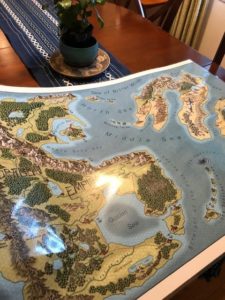 The map is done! I’m thrilled to show off the map for Art of Wuxia! It turned out quite lovely. The map scale is similar to the Keranak Kingdoms, the default setting for BareBones Fantasy RPG by DWD Studios.
The map is done! I’m thrilled to show off the map for Art of Wuxia! It turned out quite lovely. The map scale is similar to the Keranak Kingdoms, the default setting for BareBones Fantasy RPG by DWD Studios.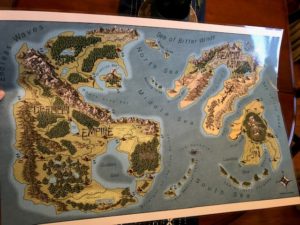 Another design choice, and a hard one, was that I decided to use English place names for the vast majority of locations. Some places are named after great heroes so retain a Chinese flavor. Older places of importance are still referred to in the Old Tongue (Chinese) within the text of the book. I also wanted players to understand that there is a North Dragon and a South Dragon fortress. Their names in the Old Tongue are Beilong and Nanlong.
Another design choice, and a hard one, was that I decided to use English place names for the vast majority of locations. Some places are named after great heroes so retain a Chinese flavor. Older places of importance are still referred to in the Old Tongue (Chinese) within the text of the book. I also wanted players to understand that there is a North Dragon and a South Dragon fortress. Their names in the Old Tongue are Beilong and Nanlong.
